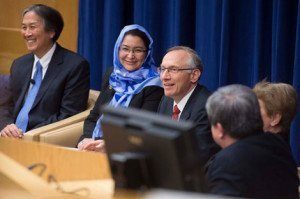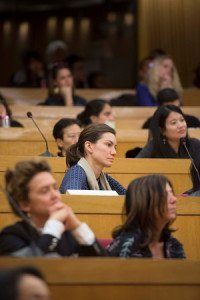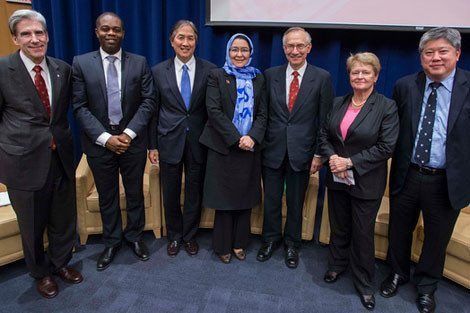October 31, 2013 — What’s the best way to approach difficult-to-achieve public health goals?
Be flexible. Be comfortable with “good enough.” See the glass as half-full instead of half-empty.
Those were some of the recommendations from five ministerial-level public health leaders who spoke to a packed house in Kresge G-1 at Harvard School of Public Health (HSPH) on October 25, 2013, as part of the School’s Centennial Leadership Summit. The panelists shared insights about why they chose public health and what they’d most like to see achieved in the years to come.
The event was part of a two-day celebration of HSPH’S Centennial that included an awards ceremony, a Gala dinner, and other talks and small group discussions about various aspects of public health.

The panel was moderated by Harvey Fineberg, AB ’67, MD ’71, MPP ’72, PHD ’80, president of the Institute of Medicine and former Dean of HSPH. The panelists, introduced by HSPH Dean Julio Frenk, included Gro Harlem Brundtland, MPH ’65, former Prime Minister of Norway and former Director-General of the World Health Organization (WHO); Suraya Dalil, MPH ’05, Minister of Public Health of Afghanistan; Howard Koh, Assistant Secretary for Health for the U.S. Department of Health and Human Services; Kelechi Ohiri, MPH ’02, SM ’03, Senior Adviser, Federal Ministry of Health, Nigeria; and Pradit Sintavanarong, MPH ’89, Minister of Public Health of Thailand.
‘Impacting lives on a large scale’
Fineberg opened the discussion by asking the panelists what led them to the field of public health. Dalil recounted how, while working in the northern part of Afghanistan following medical school, she learned that hundreds of children had died from measles in just a few weeks’ time. “I never expected to see a graveyard of children who died … from a preventable, treatable disease,” said Dalil. The experience led her to reconsider her decision to become a surgeon and instead turn to public health, so that instead of saving just one life at a time she could potentially save hundreds or thousands.
Ohiri recalled attending to a woman with a severely jaundiced child while he was in medical school in Nigeria. He treated the child and counseled the woman. But the following year, the same woman appeared again, with another severely jaundiced child. It was then that he realized there was only so much he could accomplish one-on-one with patients; he turned to public health because he “felt very strongly about impacting lives on a large scale.”
Fineberg told his own public health story: During a volunteer summer job in the Head Start program in Pittsburgh, he watched a group of 3- to 5-year-old children “devour” snacks served first thing in the morning. After seeing this for three days in a row, Fineberg said, “It dawned on me that these children were coming in the morning hungry. To see, in my own hometown, a mile from where I grew up, hunger in America, just shocked me. It just opened my eyes to problems that I thought were unacceptable.”
In hindsight…
Fineberg also asked panelists if there was anything about public health they wished they’d known ten years earlier than they had.
 Koh, former professor of the practice of public health at HSPH, said he wishes he’d known “to be absolutely steadfast in your commitment to mission, but also absolutely flexible on how you implement that mission.” People may have clear goals and think they have a straight path to achieve them, “but it never works that way,” he said. Ohiri’s message was similar: he said he wished he’d known the importance of appreciating small wins. “One needs to be comfortable with the trade-offs that need to be made and to avoid being jaded or cynical, as we see a lot in public health,” he said.
Koh, former professor of the practice of public health at HSPH, said he wishes he’d known “to be absolutely steadfast in your commitment to mission, but also absolutely flexible on how you implement that mission.” People may have clear goals and think they have a straight path to achieve them, “but it never works that way,” he said. Ohiri’s message was similar: he said he wished he’d known the importance of appreciating small wins. “One needs to be comfortable with the trade-offs that need to be made and to avoid being jaded or cynical, as we see a lot in public health,” he said.
Sintavanarong said he wishes he’d known how powerful a tool public health can be in politics—and the importance of good leadership.
Brundtland—who on October 24 received one of three Centennial Medals bestowed by HSPH—said she would like to have fully realized how important it is for the private and public sectors to work together to achieve public health goals. Working at WHO beginning in 1998, she realized that many intelligent, well-educated public health experts thought it would be ineffective, or even dangerous, to work with private companies. But Brundtland said such cooperation was crucial in goals such as reducing the price of AIDS medications, improving the nutritional quality of food, and reducing tobacco addiction.
Hopes for the future
When Fineberg asked the panelists which major unsolved public health challenge they’d most like to see addressed, Dalil said she would welcome more of a focus on governance and accountability, equity and distribution of resources, peace development, and women’s empowerment—all of which play a major role in people’s health.
Brundtland cited the importance of reducing discrimination against women around the world. For instance, Brundtland decried the fact that hundreds of millions of women lack access to “something as fundamental and easy as universal access to family planning.” She said the lack of adequate family planning affects problems related to health, food, water, energy use, and population. On a positive note, she spoke of a growing awareness that, to address major global challenges, “Women are the key to it all.”
photos: Tony Rinaldo
